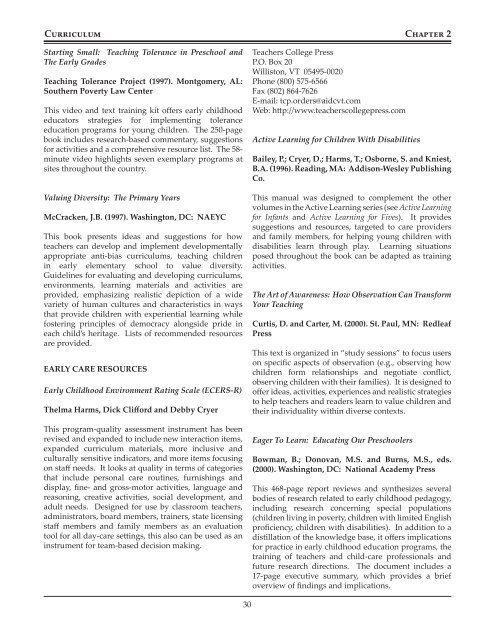Early Childhood
Early Childhood
Early Childhood
You also want an ePaper? Increase the reach of your titles
YUMPU automatically turns print PDFs into web optimized ePapers that Google loves.
Curriculum Chapter 2<br />
Starting Small: Teaching Tolerance in Preschool and<br />
The <strong>Early</strong> Grades<br />
Teaching Tolerance Project (1997). Montgomery, AL:<br />
Southern Poverty Law Center<br />
This video and text training kit offers early childhood<br />
educators strategies for implementing tolerance<br />
education programs for young children. The 250-page<br />
book includes research-based commentary, suggestions<br />
for activities and a comprehensive resource list. The 58minute<br />
video highlights seven exemplary programs at<br />
sites throughout the country.<br />
Valuing Diversity: The Primary Years<br />
McCracken, J.B. (1997). Washington, DC: NAEYC<br />
This book presents ideas and suggestions for how<br />
teachers can develop and implement developmentally<br />
appropriate anti-bias curriculums, teaching children<br />
in early elementary school to value diversity.<br />
Guidelines for evaluating and developing curriculums,<br />
environments, learning materials and activities are<br />
provided, emphasizing realistic depiction of a wide<br />
variety of human cultures and characteristics in ways<br />
that provide children with experiential learning while<br />
fostering principles of democracy alongside pride in<br />
each child’s heritage. Lists of recommended resources<br />
are provided.<br />
EARLY CARE RESOURCES<br />
<strong>Early</strong> <strong>Childhood</strong> Environment Rating Scale (ECERS-R)<br />
Thelma Harms, Dick Clifford and Debby Cryer<br />
This program-quality assessment instrument has been<br />
revised and expanded to include new interaction items,<br />
expanded curriculum materials, more inclusive and<br />
culturally sensitive indicators, and more items focusing<br />
on staff needs. It looks at quality in terms of categories<br />
that include personal care routines, furnishings and<br />
display, fine- and gross-motor activities, language and<br />
reasoning, creative activities, social development, and<br />
adult needs. Designed for use by classroom teachers,<br />
administrators, board members, trainers, state licensing<br />
staff members and family members as an evaluation<br />
tool for all day-care settings, this also can be used as an<br />
instrument for team-based decision making.<br />
30<br />
Teachers College Press<br />
P.O. Box 20<br />
Williston, VT 05495-0020<br />
Phone (800) 575-6566<br />
Fax (802) 864-7626<br />
E-mail: tcp.orders@aidcvt.com<br />
Web: http://www.teacherscollegepress.com<br />
Active Learning for Children With Disabilities<br />
Bailey, P.; Cryer, D.; Harms, T.; Osborne, S. and Kniest,<br />
B.A. (1996). Reading, MA: Addison-Wesley Publishing<br />
Co.<br />
This manual was designed to complement the other<br />
volumes in theActive Learning series (see Active Learning<br />
for Infants and Active Learning for Fives). It provides<br />
suggestions and resources, targeted to care providers<br />
and family members, for helping young children with<br />
disabilities learn through play. Learning situations<br />
posed throughout the book can be adapted as training<br />
activities.<br />
The Art of Awareness: How Observation Can Transform<br />
Your Teaching<br />
Curtis, D. and Carter, M. (2000). St. Paul, MN: Redleaf<br />
Press<br />
This text is organized in “study sessions” to focus users<br />
on specific aspects of observation (e.g., observing how<br />
children form relationships and negotiate conflict,<br />
observing children with their families). It is designed to<br />
offer ideas, activities, experiences and realistic strategies<br />
to help teachers and readers learn to value children and<br />
their individuality within diverse contexts.<br />
Eager To Learn: Educating Our Preschoolers<br />
Bowman, B.; Donovan, M.S. and Burns, M.S., eds.<br />
(2000). Washington, DC: National Academy Press<br />
This 468-page report reviews and synthesizes several<br />
bodies of research related to early childhood pedagogy,<br />
including research concerning special populations<br />
(children living in poverty, children with limited English<br />
proficiency, children with disabilities). In addition to a<br />
distillation of the knowledge base, it offers implications<br />
for practice in early childhood education programs, the<br />
training of teachers and child-care professionals and<br />
future research directions. The document includes a<br />
17-page executive summary, which provides a brief<br />
overview of findings and implications.


